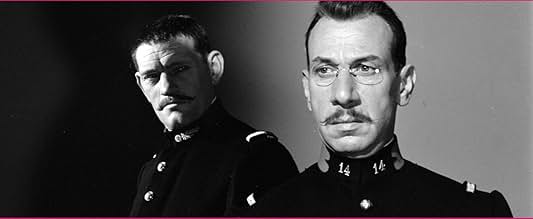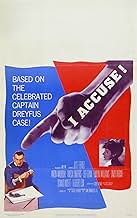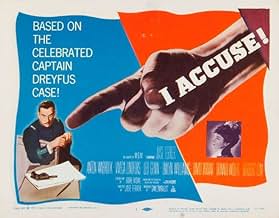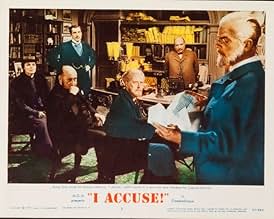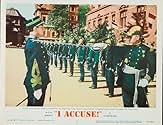VALUTAZIONE IMDb
7,2/10
792
LA TUA VALUTAZIONE
Aggiungi una trama nella tua linguaIn 1894 France, a Jewish officer in the French Army is falsely accused of spying for Germany.In 1894 France, a Jewish officer in the French Army is falsely accused of spying for Germany.In 1894 France, a Jewish officer in the French Army is falsely accused of spying for Germany.
José Ferrer
- Captain Dreyfus
- (as Jose Ferrer)
Recensioni in evidenza
10dobbs-12
This is a true story of the Alfred Dreyfus indictment and imprisonment of an innocent man who loved his country. Dreyfus was a Jew in the French army and that is probably the main reason he was persecuted and found guilty of treason. The man was innocent but sent to Devil's Island anyway. He finally was released and his honor restored. His living relative (actor Richard Dreyfus) made a film of this tragedy and it is without a doubt one of the best films I've watched lately. Be sure to watch them both because this is history.
The issues raised by the terrible injustice inflicted upon Captain Alfred Dreyfus and Emile Zola's subsequent rallying cry 'J'accuse' in 'L'Aurore' of 1898 are timeless and have certainly struck a chord with film-makers, enabling many of them to draw parallels with their own times and experiences.
The final speech by Paul Muni as Zola in William Dieterle's excellent biopic is a veiled reference to the rise of Nazism although strangely, considering that Dreyfus was Jewish, no one utters the words 'Jew' or 'anti-Semitic'. Fast forward eighty odd years and we have a version by Roman Polanski for whom the Jewish element would have provided many painful memories. There are those who have seen in his film an allegory of the director's own perceived persecution by LA County! Yves Boisset's TV film reflects his cinematic crusade to depict institutionalised corruption whilst the Ken Russell/Richard Dreyfus version is just one too many. Mr. Dreyfus is advertising his liberal credentials here and claims to be a descendant of the unfortunate Captain. The fascination of the eleven minute series by Georges Melies stems from its being made whilst the Dreyfus affair was still raging. I have alas never seen Richard Oswald's version and would be interested to see how the Germans handled the subject.
This adaptation from 1958 is directed by and stars well-known liberal José Ferrer, is produced by Sam Zimbalist and has a screenplay by Gore Vidal. Hardly surprising therefore that there are distinct echoes here of the McCarthy witch hunts.
It is made in a very matter-of-fact manner and some of the leading characters are under-written but the emotive material and strong performances carry us through.
A contingent of dependable British thespians is on dispay here notably Leo Genn whose genteel persona suits perfectly the character of Major Picquart who campaigned tirelessly for Dreyfus' acquittal whilst the odious General Mercier of Donald Wolfit epitomises Oscar Wilde's observation that "patriotism is the virtue of the vicious." Equally obnoxious is Major du Paty played by the superlative Herbert Lom, sans peruke. The two performances that linger longest are those of Swedish born Viveca Lindfors who brings her customary intelligence and sensitivity to the role of Madame Dreyfus and the immaculate Austrian Anton Walbrook who effortlessly steals all of his scenes as the charming but despicable Major Esterhazy.
José Ferrer achieves the Herculean task of being both director and portraying Dreyfus. A previous reviewer, female naturally, has remarked upon Mr. Ferrer's lack of charisma and sex appeal. I was not aware that Dreyfus possessed either of those attributes or that Mr. Ferrer was ever called upon to play a role that required them. He is immensely sympathetic in the part and what he does possess is that golden voice.
The film proudly announces that Dreyfus' eventual acquittal and reinstatement represent a brave chapter in French history. This is of course absolute tosh for were it not for the bravery and determination of a few individuals, Dreyfus would have been left to rot on Devil's Island.
The final speech by Paul Muni as Zola in William Dieterle's excellent biopic is a veiled reference to the rise of Nazism although strangely, considering that Dreyfus was Jewish, no one utters the words 'Jew' or 'anti-Semitic'. Fast forward eighty odd years and we have a version by Roman Polanski for whom the Jewish element would have provided many painful memories. There are those who have seen in his film an allegory of the director's own perceived persecution by LA County! Yves Boisset's TV film reflects his cinematic crusade to depict institutionalised corruption whilst the Ken Russell/Richard Dreyfus version is just one too many. Mr. Dreyfus is advertising his liberal credentials here and claims to be a descendant of the unfortunate Captain. The fascination of the eleven minute series by Georges Melies stems from its being made whilst the Dreyfus affair was still raging. I have alas never seen Richard Oswald's version and would be interested to see how the Germans handled the subject.
This adaptation from 1958 is directed by and stars well-known liberal José Ferrer, is produced by Sam Zimbalist and has a screenplay by Gore Vidal. Hardly surprising therefore that there are distinct echoes here of the McCarthy witch hunts.
It is made in a very matter-of-fact manner and some of the leading characters are under-written but the emotive material and strong performances carry us through.
A contingent of dependable British thespians is on dispay here notably Leo Genn whose genteel persona suits perfectly the character of Major Picquart who campaigned tirelessly for Dreyfus' acquittal whilst the odious General Mercier of Donald Wolfit epitomises Oscar Wilde's observation that "patriotism is the virtue of the vicious." Equally obnoxious is Major du Paty played by the superlative Herbert Lom, sans peruke. The two performances that linger longest are those of Swedish born Viveca Lindfors who brings her customary intelligence and sensitivity to the role of Madame Dreyfus and the immaculate Austrian Anton Walbrook who effortlessly steals all of his scenes as the charming but despicable Major Esterhazy.
José Ferrer achieves the Herculean task of being both director and portraying Dreyfus. A previous reviewer, female naturally, has remarked upon Mr. Ferrer's lack of charisma and sex appeal. I was not aware that Dreyfus possessed either of those attributes or that Mr. Ferrer was ever called upon to play a role that required them. He is immensely sympathetic in the part and what he does possess is that golden voice.
The film proudly announces that Dreyfus' eventual acquittal and reinstatement represent a brave chapter in French history. This is of course absolute tosh for were it not for the bravery and determination of a few individuals, Dreyfus would have been left to rot on Devil's Island.
This film is based on the true story of Captain Dreyfus of the French Army who, based on weak evidence, is wrongly accused of treason. The film takes place over a seven year period beginning in 1894 Captain Dreyfus comes from a wealthy industrial family but because of love of his country, joins the military rather than help run the family business. His family are Jewish and originally come from an area of Germany. It is discovered that a spy within the officers assigned to a leading General is selling military secrets to foreign agents. Dreyfus is a dour, by-the-book, military Beauregard who has no friends within the command and because of his Jewish and German heritage the military makes him a scapegoat to the crime. Jose Ferrer stars and directs an international cast. Based on the book by Nicholas Halasz, I Accuse is adapted by novelist Gore Vidal in the 2nd screenplay of his career. Photographing this film is veteran cinematographer Freddie Young, whose career lasted 57 years and included three Oscars for Doctor Zhivago, Ryan's Daughter and Lawrence of Arabia. Vivica Lindfors, who was my 4th cousin, plays Dreryfus' wife Lucie. Also among the cast are Anton Walbrook, Donald Wolfit and Herbert Lom. Ferrer is kind of dry and one dimensional and plays the entire film with one emotion. There is not a lot for Lindfors to do. Several of the cast turn in fine performances in this film that was made to mirror the recent McCarthy era witch hunts. There are no closeups and the entire film uses heavy shadows in every scene, indoor and out. This film was remade with Richard Dreyfus who is said to be a family descendant of Captain Dreyfus in the starring role. It's a good historical drama but as a film it falls a little short. I would give it a 7.5 out of 10.
The most interesting characteristic of this film is its almost militarily disciplined restraint. It is all about the glory and honour of the military, and most of the actors are military officers. José Ferrer has directed this film focusing on military mentality and managing very well in bringing forth both the good sides of it and the worst, the unreasonableness of disciplinary rigour. The film is crowded with outstanding actors, like David Farrar as the brother, Felix Aylmer as the old lawyer, Herbert Lom as the relentless calligraphic expert, Anton Walbrook as a very suave and clever Esterhazy, and above all, the beautiful Viveca Lindfors as the wife. I had been searching for this film for years when it suddenly appeared on my menu, and although my expectations were the very highest, I was positively surprised. The best actor of all here is José Ferrer himself as the culprit, and although Captain Dreyfus has been brought on film many times, this must be the best interpretation of the character. The scenes of his trials on Devil's Island are heartbreaking without going to extremes, also here the director sticks to his very objective discipline. It is a most admirable treasure of a film, priceless and precious, while Emile Zola is a little played down. Well, he had his own film in 1938 with Paul Muni, in which film Dreyfus almost stole the entire show, so even Emile Zola has to conform here to the strict discipline of the impressingly military discipline of this extremely important film.
Jose Ferrer acted in more than 100 movies and TV episodes. One of his sons, Miguel Ferrer, and a nephew, George Clooney, followed successfully his steps in the movie business. All this was not an accident. Jose Ferrer's Oscar winning performance in Cyrano De Bergerac in 1950 was followed 8 years later in I Accuse! Although not winning another Oscar, his portrayal of a French Jewish artillery captain, Alfred Dreyfus, falsely accused of treason in 1894, sentenced and sent to Devil's Island, makes one feel what the relative of actor Richard Dreyfus felt while publicly being degraded, his sword broken and what he had to live in the tropical God forgotten Atlantic island, 7 miles off the coast of French Guiana, where he was sent at the beginning of 1895. Many people stood for him, like French writer Emile Zola and one can check it in Paul Muni's The Life of Emile Zola, but there is NO DVD RELEASE OF "I ACCUSE"! So I Accuse the studio MGM or whoever has the rights now days, of negligence in not releasing this movie on DVD. I can write down a thousand titles list of crap movies released by MGM, worthless garbage, in the past 20 or so years, but they had to miss this one. Shame on whoever is in charge of selecting which movies to be released on DVD and which not. Who died and made him God in that department? Wake up MGM and deal with this. I bet anything that I'm not the only one that wants that movie released on DVD.
Lo sapevi?
- QuizThis movie was not shot in widescreen. It was converted to CinemaScope in the final print after having been shot in standard Academy ratio, much like some movies, which are "matted" after having been shot in Academy ratio. The process used was contemporary of SuperScope and a forerunner of Super 35. It was filmed using spherical lenses at an aspect ratio of 1.37:1. In the printing process, the images were cropped to a height of two perforations, giving them an aspect ratio of 2.36:1. The images were then stretched vertically to a height of four perforations, at which point they conformed to the standard CinemaScope-2 format.
- Citazioni
Émile Zola: This Esterhazy is one of the most glorious liars that ever drew breath. Why, the authority of it, the poise; the man's a genius!
- Curiosità sui crediti[Scrolling Prologue] In 1894 Alfred Dreyfus, a French Army officer, stood before a military tribunal accused of treason. The outcome of this trial, a trial that created an international sensation, is a brave chapter in the history of France, that nation which first proclaimed the Rights of Man.
I più visti
Accedi per valutare e creare un elenco di titoli salvati per ottenere consigli personalizzati
- How long is I Accuse!?Powered by Alexa
Dettagli
Botteghino
- Budget
- 1.800.000 USD (previsto)
- Tempo di esecuzione1 ora 39 minuti
- Colore
- Mix di suoni
- Proporzioni
- 2.35 : 1
Contribuisci a questa pagina
Suggerisci una modifica o aggiungi i contenuti mancanti

